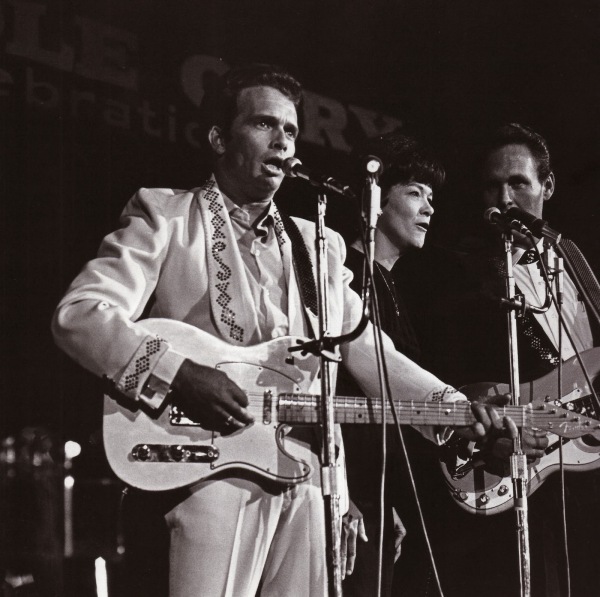NEW YORK TIMES: Few country artists have been as popular and widely admired as Mr. Haggard. Thirty-eight of his singles, including “Workin’ Man Blues” and the 1973 recession-era lament “If We Make It Through December,” reached No. 1 on the Billboard country chart from 1966 to 1987. He released 71 Top 10 country hits in all, 34 in a row from 1967 to 1977. Seven of his singles crossed over to the pop charts. Mr. Haggard had an immense influence on other performers — not just other country singers but also ’60s rock bands like the Byrds and the Grateful Dead, as well as acts like Elvis Costello and the Mekons, all of whom recorded Mr. Haggard’s songs. Some 400 artists have released versions of his 1968 hit “Today I Started Loving You Again.”
He was always the outsider. His band was aptly named the Strangers. Unlike his friend Johnny Cash, Mr. Haggard didn’t merely visit San Quentin State Prison to perform for the inmates. Convicted of burglary in 1957, he served nearly three years there and spent his 21st birthday in solitary confinement.
Mr. Haggard went on to write “Mama Tried,” “Branded Man” and several other candid songs about his incarceration, all of them sung in a supple baritone suffused with dignity and regret. Many of his other recordings championed the struggles of the working class from which he rose. He became known as a poet of the common man. Defying the conventions of the Nashville musical establishment, Mr. Haggard became an architect of the twangy Bakersfield sound, a guitar-driven blend of blues, jazz, pop and honky-tonk that traced its roots to Bakersfield, Calif., and that, in Mr. Haggard’s case, defined a body of work as indelibly as that of any country singer since Hank Williams. MORE
ROLLING STONE: Haggard bought this land in 1980. He was 43 years old, twice divorced and 14 years into an amazing streak of 26 Number One country singles, with another dozen to come in the next decade. Haggard’s early hits – “The Fugitive,” “Branded Man,” “Mama Tried,” “Hungry Eyes,” “Workin’ Man Blues,” “Okie From Muskogee,” “Sing Me Back Home” – form the backbone of one of the greatest repertoires in all of American music, plain-spoken songs populated by the kinds of working people Haggard grew up with: farmers, hobos, convicts, widows, musicians and drunks.
Mostly, though, Haggard’s early songs narrate the difficult circumstances of his own life: The son of Dust Bowl migrants from Oklahoma to the San Joaquin Valley, Haggard lost his father at age nine, hopped his first train a year later, and spent his teenage years in and out of juvenile institutions, military schools and, eventually, San Quentin. “Johnny Cash once told me, ‘Hag, you’re the guy people think I am,'” Haggard says. He spent nearly half of his first 21 years “running away or behind bars,” he says. “I would’ve become a lifetime criminal if music hadn’t saved my ass.”
Haggard’s songs look on his early life with a mixture of pride and regret, and they are sung in a warm, rangy baritone, strong but hinting at a deeper vulnerability, with little of the cornball sentimentality that characterized much 1960s country. “Merle Haggard has always been as deep as deep gets,” says Bob Dylan. “Totally himself. Herculean. Even too big for Mount Rushmore. No superficiality about him whatsoever. He definitely transcends the country genre. If Merle had been around Sun Studio in Memphis in the Fifties, Sam Phillips would have turned him into a rock & roll star, one of the best. I’m sorta glad he didn’t do it, though, because then he’d be on the oldies circuit singing his rock & roll hits instead of becoming the Merle Haggard we all know and love.” MORE

